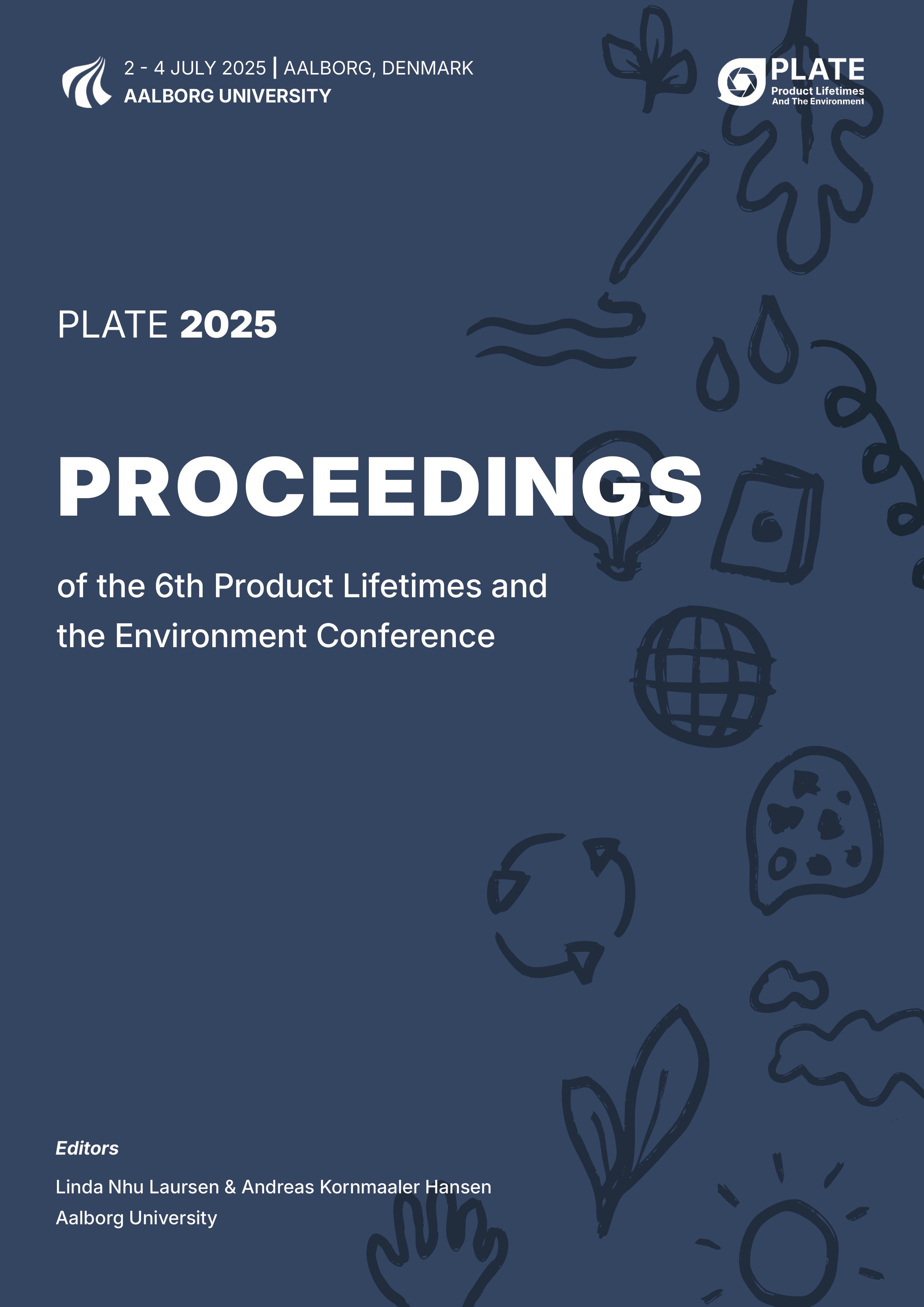Reviving Bedlinen
User Expectations, Use-Life, and Repair Practices in Australia
DOI:
https://doi.org/10.54337/plate2025-10310Keywords:
Bedlinen, Home Textiles, Product Expectations, Repair, CircularityAbstract
This paper considers the relationship between user expectations of domestic bedlinen, product use-life and repair engagement within an Australian context. Bedlinen, in this instance, includes flat and fitted sheets, pillowcases, and quilt covers - also known as duvet covers, or in Australia, doona covers. There is limited data on this specific textile product within sustainability and circularity research. This paper discusses findings from the survey, Bedlinen and Sustainability (2023), which includes questions focused upon attitudes and behaviour regarding bedlinen purchase, use, care, repair, reuse and disposal. Key findings are identified and are discussed as factors that directly impact the use-life of bedlinen. These include laundering choices, emotional durability, change of mattress sizes, expectations of comfort, maintaining original condition, and repair challenges.
References
Ahirwar, M., Khatkar, V., & Behera, B. K. (2020). An integrated approach to develop performance index of bed linen fabric. Journal of Industrial Textiles, 51(1_suppl), 842S-855S. https://doi.org/10.1177/1528083720942963
Appadurai, A. (1988). The social life of things: Commodities in cultural perspective. Cambridge University Press.
Ayling-Smith, B. (2018). The Bedsheet: From Linen Cupboard to Art Gallery. TEXTILE, 16(3), 287-300. https://doi.org/10.1080/14759756.2018.1432142
Bakker, C. A., Mugge, R., Boks, C., & Oguchi, M. (2021). Understanding and managing product lifetimes in support of a circular economy. Journal of Cleaner Production, 279, 123764. https://doi.org/https://doi.org/10.1016/j.jclepro.2020.123764
Barnard, M. (2014). Fashion theory : an introduction. Routledge.
Chanda, T., Ahirwar, M., & Behera, B. K. (2020). Appraisal of bed linen performance with respect to sleep quality. Textile & Leather Review, 3(1), 19-29. DOI: 10.31881/TLR.2020.01
Chapman, J. (2015). Emotionally durable design : objects, experiences and empathy (Second edition. ed.). London New York : Routledge, Taylor & Francis Group.
Cooper, T. (2020). Slower Cycles: An Essential Characteristic of the Circular Economy. In S. Eisenriegler (Ed.), The Circular Economy in the European Union: An Interim Review (pp. 99-116). Springer International Publishing. https://doi.org/10.1007/978-3-030-50239-3_9
Cotton, L., Hayward, A. S., Lant, N. J., & Blackburn, R. S. (2020). Improved garment longevity and reduced microfibre release are important sustainability benefits of laundering in colder and quicker washing machine cycles. Dyes and Pigments, 177, 108120. https://doi.org/https://doi.org/10.1016/j.dyepig.2019.108120
Douglas, M. (2003). Purity and danger: an anaylsis of concepts of pollution and taboo. London : Rougledge.
Dubale, M., Ejegu, H., Mamuye, W., & Addis, S. (2021). Development of Bed Linen Performance Index. Journal of Engineering, 2021, 1220130. https://doi.org/10.1155/2021/1220130
Gnanapragasam, A., Oguchi, M., Cole, C., & Cooper, T. (2017). Consumer expectations of product lifetimes around the world: a review of global research findings and methods. In (pp. 464-469). https://doi.org/10.3233/978-1-61499-820-4-464
Godin, L., Senja, L., & and Sahakian, M. (2020). Doing laundry in consumption corridors: wellbeing and everyday life. Sustainability: Science, Practice and Policy, 16(1), 99-113. https://doi.org/10.1080/15487733.2020.1785095
Gram‐Hanssen, K., & Bech‐Danielsen, C. (2004). House, home and identity from a consumption perspective. Housing, Theory and Society, 21(1), 17-26. https://doi.org/10.1080/14036090410025816
Harper, D. (2023). Repair. Etymology Online. Retrieved 1 October from https://www.etymonline.com/word/repair
Healy, R. (2009). Striptease: An investigation of curatorial practices for fashion in the museum
Jensen, P. B., Haase, L. M., & Laursen, L. N. (2021). A Practical Approach to Companies’ Transformation toward Product Longevity: A Best-Case Study. Sustainability, 13(23). https://mdpi-res.com/d_attachment/sustainability/sustainability-13-13312/article_deploy/sustainability-13-13312.pdf?version=1638357201
Kamalha, E., Zeng, Y., Mwasiagi, J. I., & Kyatuheire, S. (2013). The comfort dimension; a review of perception in clothing. Journal of Sensory Studies, 28(6), 423-444. DOI: 10.1111/joss.12070
Kergoat, M., Giboreau, A., Nicod, H., Faye, P., Diaz, E., Beetschen, M.-A., & Meyer, T. (2012). CONSUMER PREFERENCE FOR TACTILE SOFTNESS: A QUESTION OF AFFECT INTENSITY? Journal of Sensory Studies, 27(4), 232-246. https://doi.org/https://doi.org/10.1111/j.1745-459X.2012.00388.x
Laitala, K., Boks, C., & Klepp, I. G. (2011). Potential for environmental improvements in laundering. International journal of consumer studies, 35(2), 254-264. https://doi.org/https://doi.org/10.1111/j.1470-6431.2010.00968.x
Lowry, E. (2020). Household textiles 1660-1850: hidden items of material culture from the country house. Family & community history, 23(2), 95-118. https://doi.org/10.1080/14631180.2020.1820717
Maycroft, N. (2024). A culture of visible mending: improvisation, or bodging the job? https://repository.lincoln.ac.uk/articles/conference_contribution/A_culture_of_visible_mending_improvisation_or_bodging_the_job_/25167428
McLaren, A., Oxborrow, L., Cooper, T., Hill, H., & Goworek, H. (2015). Clothing longevity perspectives: exploring consumer expectations, consumption and use. In Product Lifetimes and the Environment (PLATE) Conference proceedings, [Nottingham Trent University], Nottingham, 17-19 June 2015. (pp. 229-235). Nottingham Trent University: CADBE.
Merriam-Webster. (2017). A Tale of Two 'Repairs'. Merriam-Webster. Retrieved 1 October from https://www.merriam-webster.com/wordplay/a-tale-of-two-repairs
Parsons, H. M. (1972). The Bedroom. Human Factors, 14(5), 421-450. https://doi.org/10.1177/001872087201400505
Rao, N., Salvidge, C., Doriza, A., & Downing, P. (2023). Citizen Insights: Estimating the longevity of home textiles in the UK. WRAP. https://wrap.org.uk/resources/report/citizen-insights-estimating-longevity-home-textiles-uk#download-file
Rinkinen, J., Jalas, M., & Shove, E. (2015). Object relations in accounts of everyday life. Sociology, 49(5), 870-885. https://doi.org/10.1177/0038038515577910
Shove, E. (2003). Comfort, cleanliness and convenience : the social organization of normality. BERG.
Shove, E. (2004). Sustainability, System Innovation and the Laundry
System Innovation and the Transition to Sustainability. In. Edward Elgar Publishing. https://doi.org/10.4337/9781845423421.00014
Sleep Hygiene: Good Sleep Habits. (2024). Sleep Health Foundation. https://www.sleephealthfoundation.org.au/sleep-topics/sleep-hygiene-good-sleep-habits
Spelman, E. V. (2002). Repair : the impulse to restore in a fragile world. Beacon Press Boston.
Sundaresan, S., Ramesh, M., Sabitha, V., & Ramesh, V. (2016). A detailed analysis on physical and comfort properties of bed linen woven fabrics. International Journal of advance researn and innovative ideas in education, 2, 1649 to 1658.
Tronto, J. C. (2013). Caring Democracy : Markets, Equality, and Justice. New York University Press. http://ebookcentral.proquest.com/lib/unsw/detail.action?docID=1153346
Walker, S. (1995). The Environment, Product Aesthetics and Surface. Design Issues, 11(3), 15-27. https://doi.org/10.2307/1511767
Yates, L., & Evans, D. (2016). Dirtying Linen: Re-evaluating the sustainability of domestic laundry. Environmental Policy and Governance, 26(2), 101-115. https://doi.org/https://doi.org/10.1002/eet.1704




